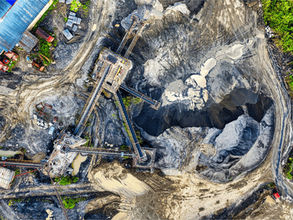top of page
Articles


From Factory to Footprint: A Closer Look at Carbon Intensity
When you buy something new, a phone, sneakers, or even a simple coffee cup, there’s more to it than just the price tag. Behind the scenes sits a rarely recognized number, carbon intensity. Seldom on labels, but it reveals production efficiency and the climate impact of each unit.
2 hours ago


How Dynamic Material Passports Could Change Construction in Canada
Construction in Canada is growing fast, and regions like Halton feel the pressure more than most. More people means more homes, more offices, and more demand for materials. The problem is that traditional construction still follows a simple path. Extract, build, demolish, discard. It works in the short term, but it creates a massive volume of waste and uses an incredible amount of natural resources.
Feb 2


Carbon Capture and Storage in Canada, Where We Stand Today
Carbon capture and storage (CCS) in Canada is not a climate change silver bullet, but it is a growing part of how we are dealing with hard-to-eliminate carbon emissions.
Jan 23


Smarter Water Measurement for More Sustainable Use
Water measurement is not at the top of the sustainability goals list. Running water is left to habit and chance, which is why we waste so much water. General awareness campaigns don’t seem to be making a big dent, but there is a way to use technology to change even habitual patterns to save water.
Jan 16


Canada’s AI Data Centre Push Races Ahead
Canada spends billions on building domestic AI computing power. New data centres are announced for Quebec and Alberta. The idea is to keep our data in Canada, support research, and stay competitive.
Jan 9


Safer Nights in Rural Halton, Thanks to Smart Streetlighting
Rural roads in rural Halton, Ontario, get dark, fast. Anyone who has driven along Halton-Erin Road after sunset knows how limited the visibility can be, especially in the long stretches without sidewalks or clear shoulders. As more people move into peri-urban areas, those roads are busier than ever. The problem is that the lighting hasn’t kept up.
Dec 10, 2025


Why Mining Costs More in Canada Than in China
Canada’s mining costs are higher than China’s due to strict environmental rules and infrastructure challenges for cleaner, more sustainable operations.
Nov 24, 2025


Are Sodium-Ion Batteries Finally Ready for Everyday Use?
Sodium-ion batteries have been sitting on the sidelines for years. Lithium-ion took the spotlight, powering EVs, phones, backup systems, you name it. Yet the cracks in the lithium story keep getting harder to ignore. High costs, tight supply chains, safety risks, and terrible cold-weather performance all take a toll.
Nov 17, 2025


Are We Too Late to Save B.C.’s Southern Resident Orcas?
The Southern Resident Killer Whales (SRKW) are down to roughly 74 individuals, and scientists are warning that, without serious action, they could disappear within a few decades.
Nov 3, 2025


How China and Canada Differ on Mining Oversight. Why Overseas Footprints Look Similar
Canada and China’s mining rules differ at home, but abroad, their oversight converges, raising questions about global green standards and enforcement.
Oct 30, 2025


Canada’s Mining Regulations Are Some of the Toughest in the World
Canada’s mining sector faces strict regulations balancing economic growth with environmental protection, setting a global standard for resource extraction.
Oct 24, 2025


Lark Scientific Joins Forces with University of Waterloo to Catalyze Student-Driven Sustainability Innovation
Lark Scientific is proud to announce our sponsorship and mentorship partnership with the University of Waterloo’s Sustainability and Social Entrepreneurship Fellowship (SSEF) program, in collaboration with Halton Region. This year’s nine-week program invited 30 multidisciplinary students to transform bold ideas into practical solutions addressing climate change, infrastructure resilience, and community sustainability in Halton Region.
Oct 22, 2025


Small Modular Reactors vs. Renewables: Which Is More Cost-Effective?
The global energy transition is unfolding at a critical moment. Nations are under mounting pressure to meet rising electricity demand while cutting emissions and keeping costs manageable. The debate often centers on two very different approaches: renewables, like solar and wind, versus nuclear’s new frontier – Small Modular Reactors (SMRs). Each has unique strengths, risks, and cost profiles, making the choice a pivotal one.
Oct 8, 2025


Turning Seawater into Freshwater: Could Graphene Filters Change the Future of Clean Water?
Water covers about 70% of our planet, yet only 3% of it is freshwater. And less than half of that is easily accessible. The rest is locked in glaciers or buried deep underground. As climate change and droughts intensify, many regions struggle to secure reliable drinking water.
Oct 2, 2025


High-tech Nature-inspired Solutions for Urban Cooling
It’s getting hotter in Canadian cities. With increasingly dangerous heat, the next frontier in urban cooling must move beyond trees and parks. Innovative technologies and design strategies are merging with natural systems to create holistic solutions for the urban heat island effect.
Sep 29, 2025


Green Infrastructure Fights Urban Heat in Canadian Cities
Canadian cities face rising temperatures as climate change intensifies the urban heat island effect. Built-up areas, full of concrete, asphalt, and steel, heat up far more than surrounding rural landscapes.
Sep 26, 2025


Are We Pushing the Planet Too Far? A Look at the Planetary Boundaries Crisis
Lark Scientific Researcher Summer Rylander explores the latest scientific findings on the health of our planet and the sobering truth that we may be running out of time.
Sep 23, 2025


Can Canada Overcome Diesel Dependence in Remote and Northern Indigenous Communities?
Canada shifts to clean energy to reduce greenhouse gas emissions and combat climate change, but remote and northern communities face some of our most pressing challenges.
Aug 30, 2025


Mass Timber – Canadian Environmental and Economic Impacts
Mass timber is about more than just beautiful buildings. It’s an innovative construction approach that helps fight climate change while boosting Canada’s economy.
Aug 27, 2025


Canada’s Mass Timber Revolution: The Future of Sustainable Building
Canada is stepping onto the world stage as a leader in mass timber construction, blending centuries of forestry expertise with the latest in engineering and design technology. This innovative building approach is transforming skylines, cutting carbon emissions, and reshaping what we think is possible in modern architecture.
Aug 25, 2025


Canada’s EV Battery Recycling Needs Urgent Action
As electric vehicle (EV) adoption continues to rise across Canada, a critical piece for sustainability remains unsolved: EV battery recycling. With over 600,000 EVs currently on the road in Canada, and the government aiming for 100% zero-emission vehicle sales by 2035, end-of-life battery management is becoming urgent.
Aug 21, 2025
bottom of page